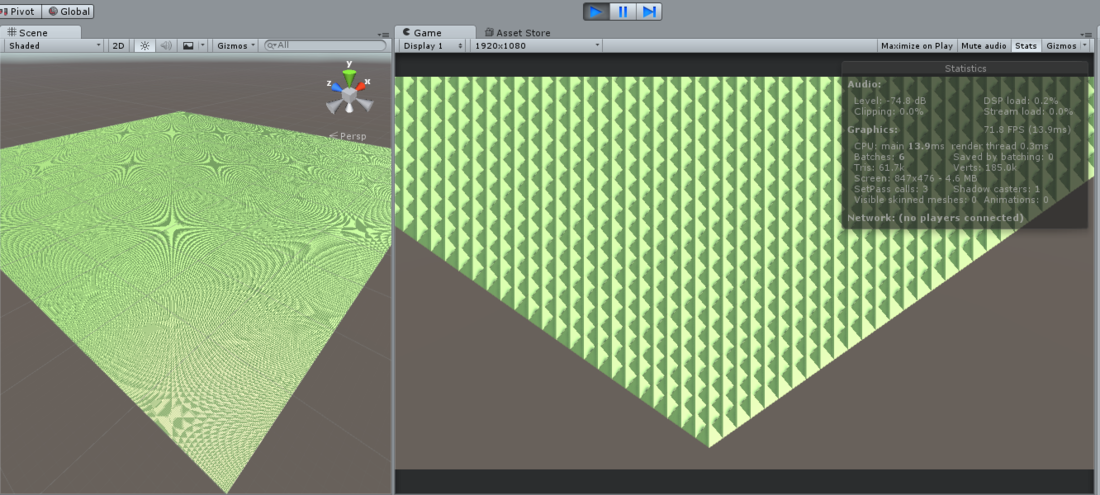Hi,
I want to create a fairly large "tilemap" with 3D assets. I started testing and have very promising results with generating the terrain mesh by code.
private Mesh createChunck(int width, int height)
{
Vector3[] verts = new Vector3[width * height * 6];
Vector2[] uvs = new Vector2[width * height * 6];
int[] triangles = new int[width * height * 6];
for (int y = 0; y < height; y++)
{
for (int x = 0; x < width; x++)
{
//Debug.Log("x: " + x + ", y: " + y);
verts[(y * width + x) * 6 + 0] = new Vector3(x, 0, y);
verts[(y * width + x) * 6 + 1] = new Vector3(x + 1, 0, y);
verts[(y * width + x) * 6 + 2] = new Vector3(x + 1, .5f, y + 1);
verts[(y * width + x) * 6 + 3] = new Vector3(x, 0, y);
verts[(y * width + x) * 6 + 4] = new Vector3(x + 1, .5f, y + 1);
verts[(y * width + x) * 6 + 5] = new Vector3(x, 0, y + 1);
uvs[(y * width + x) * 6 + 0] = new Vector2(0, 0);
uvs[(y * width + x) * 6 + 1] = new Vector2(1, 0);
uvs[(y * width + x) * 6 + 2] = new Vector2(1, 1);
uvs[(y * width + x) * 6 + 3] = new Vector2(0, 0);
uvs[(y * width + x) * 6 + 4] = new Vector2(1, 1);
uvs[(y * width + x) * 6 + 5] = new Vector2(0, 1);
for (int t = 0; t < 6; t++)
{
triangles[(y * width + x) * 6 + t] = (y * width + x) * 6 + 5 - t;
}
}
}
Mesh m = new Mesh();
m.vertices = verts;
m.uv = uvs;
m.triangles = triangles;
m.RecalculateNormals();
return m;
}
I can easily render 10 x 10 "chuncks" of 100 x 100 tiles in a scene which is should be enough. However I need the tri's to be able to change material individually, by code. Obviously without (re)generating the mesh again since that does take some time. With the following code I can change and add submeshes to the mesh.
test.subMeshCount = 2;
int[] tri1 = new int[] { 5, 4, 3 };
int[] tri2 = new int[] { 2, 1, 0 };
test.SetTriangles(tri1, 0);
test.SetTriangles(tri2, 1);And it seems like simply adding a Material array to Graphics.DrawMesh(...) but unfortunately it only takes a single material and all the triangles that are out of the submesh group 0 are not being drawn.
I could probably create a GameObject with a renderer component and thrown in the mesh and create my material array there but I don't really need/want a GameObject. I'm just looking for a clean way to render this mesh my script with different materials for it's submeshes by script.





